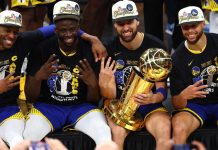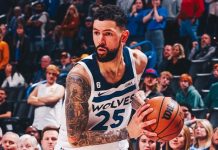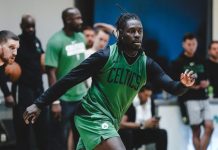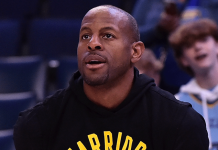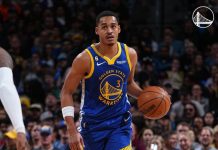Andre Iguodala enhances our understanding of the game we love, what it means to play in it and the society in which it must operate. And change.
“…one of my first life lessons and maybe the most important one: if I just keep my head down and focus on basketball, I’m generally better off.” (p. 13)
The son of a single mother from Springfield, Illinois, gives you what you crave: the childhood shrouded by challenge and effort; the life of hard work needed to go pro; the stories of playing with “the greatest backcourt of all time”, winning championships and guarding LeBron to win Finals MVP.
But, he gives more than that: the trust and respect that lay a foundation for greatness, his experience of being a black athlete in America, and showing it takes much more than keeping your head down and working hard to make it.
“My mother taught me stoicism. Toughness. She taught me love and tenderness. She taught me sacrifice and discipline, and most importantly, she taught me to get the very best out of myself.” (p. 30)
We have to start here. We have to because the rest just makes too much sense after we get this part. Iguodala’s relationship with his mother required him to read the newspaper, observe rules and to exert optimum effort at all he did. He was taught that education and work were critical ingredients to living, surviving and to the low odds of getting out. “You can get stuck here” she told him (p. 31) about his home town. Springfield suffered from a race riot in 1908 after what were later found out to be false allegations. A white mob killed 15 and caused $4 million in damage.
He tells another story. His mother went to see a game of his and ran face-to-face into another woman who had engaged her in a long, dramatic conflict. Iguodala was in sixth grade at the time: “Linda Shanklin didn’t say a word. There was no yelling, no threatening, no chest bumping.
She just took one look at her, cocked back and busted this lady dead in the face….On the one hand, no one wants to see their mom wilding out. But on the other hand, you kind of felt like, ‘Damn…’” (pp 25-26).
It was so rare to have a black student in honors that his teacher assumed he was lost his first day. And here we begin building an understanding of the man. What series of decisions that took him from this to being a key component of a championship dynasty hoisting trophies:
“So I grew up learning a balance. On the one hand it was ‘Yes ma’am. No, sir.’ On the other hand, it was a deep sense that you simply couldn’t let people fuck with you.”
This is the gist of his “third kind of black person” (p. 39). The first kind is “breaking all the rules” and the second kind “blends in too well” – eliciting odd comfort and conditional acceptance respectively. This third kind, he said, knows what they’re talking about, holds themselves to high esteem and will go to the mat if need be, and “represents the greatest threat to oppressive systems” (p. 38-39).

For anyone who grew up where just being smart or just being tough wasn’t enough, this emerges as an unmistakably recognizable quality. You can joke around, have a good time, talk ball, and talk politics with a person, but the look in the eye when difficulty comes up, it is immediately apparent that this person has had to fight their way out of corners and did so with a confidence. They learned tough lessons with unsympathetic teachers in social constructs that didn’t protect them.
Though they could go there in an instant, they would rather contribute what they can, work their ass off at what they love, study it, feel it, obsess on it, maybe even connect on it, and then go home. There is one antidote to not seeing the hard working, connective side and not the cornered version. If you understand this about Iguodala, you will know why he chose were to go to high-school, college, when to declare and which agent to use.
“There was a psychological benefit to a coach who saw you as an adult professional and who prioritized helping you along with your career above all else. It was respect.” (p. 160)
Okay, now we can go to the details of the beautiful game and his role in it. He entered free agency for the first time in 2013, one year after a trade sent him from the 76ers to the Nuggets (by a front office with at-the-time unknown VP named Masai Ujiri). He played his first eight seasons in Philly – the first two with Allen Iverson – playing all 82 games five times. He finished his tenure there with an All Star appearance offering consistent solid two way play that brought them to the playoffs five times.
When considering his options for his next team, he saw something when he played in a series agains Golden State that spring. Mark Jackson’s Warriors were “playing with confidence, and that’s a lot rarer than you think” (p. 160). Denver offered a five year/$57 million deal and a nod that he would continue starting. If you don’t remember this team imagine the promise: Wilson Chandler, the Manimal, Gallinari, Koufos, Professor Andre Miller, Ty Lawson and even Mozgov – a team that would have done very well for themselves in that era.
Entering your 10th year – and one of them leading the league in minutes at 39.9 per Basketball Reference, this might raise an eyebrow. Why not take the guaranteed money? But, we all know he left. In fact, he sought out Golden State, a team with a couple promising rookies and second year players who could shoot, though one couldn’t stay on the court.
“Respect as a human, respect as an adult, respect as a professional. Mark Jackson had that and it made you not only play better but feel better.” (p. 160)
He took a four year/$48 million in Golden State. This is why I went over the Shanklin stories because now you could predict this. We’re back to the balance. Yeah, money matters. Yeah, minutes matter. But if you got a respected role in a culture that values it where enjoyment is still a factor with a coach who cares, things are flexible.

Iguodala fit wonderfully in Jackson’s defense first, “you do you” offense and averaged 9-5-2 with a steal and a half a game. But 2014 saw them lose to the Clippers in the first round of the playoffs.
Changes were going to be made (the infamous Klay for Kevin Love was one near miss), this time it was coaching. Was there a someone who could continue a foundation of respect and a culture that valued the Warriors? What about Iggy himself? There’s no stat for locking up your matchup, for always rotating, for passing first or for moving the tempo to break down the defense.
Steve Kerr, inches away from coaching the Knicks, did something few can do: he appreciated what he had in front of him, lucked into some emerging talent and made some offensive shifts. Iguodala goes to a 8-3-3 and a steal a game in 2015. Good for a bench player, but they do not hold the mastery of a Finals MVP. So, what happened?
It isn’t just about numbers as a player. “Coach (Kerr) had recognized that late in game 4, when he went with a smaller lineup” Iguodala says of the 2015 Finals in one of his many behind-the-curtain moments, “and it meant that I was going to be guarding LeBron.” (p. 184)
Here we see Iguodala employ the two seemingly unrelated components – fanatical studying and exacting physical preparation. He said you have to be smart, watch tape, get your weight right and quickness up. “I saw that his first offensive move almost always involves some contact with you” he tells you, and “the key was to be quick” and to know “where the ball was going to end up” (p. 184). He said he got lucky. I say it’s a lot easier to be lucky when you’ve studied something and train like, well, like a warrior.
Remember, the ‘A’ block story is that this was the finals that Cleveland was going to break the dry-spell of championships across all sports in Ohio. In that series, Iggy started for the first time in 13 months. In the title-clenching Game 6, he puts up a 25-5-5 with 2 steals.

Those 25 points get a little more important when you see Klay totaled five points and fouled out with four minutes left. The Warriors caused three 24-second violations in the first 8 minutes and you can see in LeBron’s face that he’s gonna do the best he can – which was/is arguably the best in the world – but if this keeps up, even he can’t stop it.
Watch this game: Mark Jackson is on commentary showing his professionalism after being fired from the team about to win; Steph finding himself, Draymond defending everything, wild-eyed Cleveland fans screaming at Kerr like they’re going to eat him two rows back from the bench.
Oh, but Iggy: he’s hitting threes to kill Cleveland runs, dunking on fast breaks, switching onto Mozgov on the block, talking to his teammates and running a surprising amount of the offensive show. It would stay dry in Cleveland that year. “…there are three seconds on the clock and you are down by two points and you have to see, understand and predict the movements of ten men on a basketball court at one time while 45,000 people are screaming at you. A career is made of these things.” (p. 4)
He’s part of three more Finals appearances and gets two more rings once Kevin Durant joins the wrecking crew. “I was probably the most surprised” Iguodala said of Durant joining Golden State (p. 201). That may be true, though Iguodala made the same move for the same reasons, albeit under different circumstances.
“An absolute blinding obsession with the game.”
Iguodala is generous with how much he shares. You’ll hear about what he was thinking in his college decision, how coaches can lie to your face and trade you, what the feeling was to realize he could play with the best in high-school and win. You hear about bigger ideas, too, about how Curt Flood sued Major League Baseball but changed things, why confidence matters, talking with Wilson Chandler, C-Webb, Elton Brand and others about black people owning the means of production and a shared destiny. This could have been a book about highlights and numbers, but Iguodala is more thoughtful and his story is too important to boil down to just that.
“Historically athletes have been punished for speaking out on social injustices that happen within our communities…specifically Muhammad Alis, Jim Browns, Tommy Smiths.”
Interview with Bill Simmons of The Ringer, September 4, 2020
There will be more to tell about Iguodala. With 200 players in one conference room when careers and strongly held values are on the line, after the shooting of Jacob Blake in September, Iguodala’s understanding of building consensus was critical. Some players wanted to go home, others wanted real change.

Many leaders were there, both young and veteran, yet it was Iguodala who relished having players together, how to find the flow and understand how to balance message, meaning and work. For those who like watching basketball right now, we owe Iguodala thanks. For those who want a just society, we owe him thanks, too.
We hear about being told to shut up and play and LeBron was told to shut up and dribble. What is important about these comments isn’t that whoever saying them is a bigot – which they indeed are (please tell me which jobs render your opinion meaningless) – or thinking it’s cool to not like sports because jocks are dumb – which they are not. What’s important is that it is a tactic.
There’s a battle of the story out there and people will do anything to have theirs be the only one. Thank who ever you thank that Iggy and LeBron didn’t shut up. What the heck would happen to us if stories, especially of people of color or women or poor or gay or Muslim or anything at all different, reach people so that we can understand them – not always agree, but understand – and change things?
*This review was written by Adam Trott and edited by TalkBasket’s Chief Editor Yiannis Bouranis.

